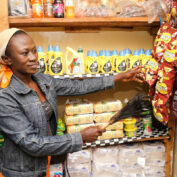Building a Legacy of Women’s Leadership in Rural Peru
In Peru's San Martín region, coffee farmer Layit Vargas Tello learned skills that helped her transform from a quiet participant in her coffee cooperative to a leader in her community.
In Peru's San Martín region, coffee farmer Layit Vargas Tello learned skills that helped her transform from a quiet participant in her coffee cooperative to a leader in her community.
In 2025, TechnoServe navigated challenges, launched exciting new initiatives, published cutting-edge research, and helped entrepreneurial people around the world create economic opportunity. Here are 10 milestone moments that marked the year at TechnoServe.

After Hurricane Maria devastated Puerto Rico’s coffee sector, Revivamos Nuestro Café helped restore production, train over 1,200 farmers, and plant 11 million trees. Stakeholders now celebrate its lasting impact.
Meet Genith Apagueño Cahuaza, a coffee farmer who reconnected with her roots and is now a coffee farmer in Peru’s San Martín region. Her journey is a powerful story of choosing farming after having traveled other paths.
Discover how a small group of Ethiopian farmers built an award-winning coffee cooperative that transformed their community from forgotten to flourishing.
Meet Carlos Cordero, a smallholder coffee farmer and TechnoServe farmer trainer in Puerto Rico who is teaching other farmers in his community how to improve their coffee production.

The new phase will bring the Smart Duka program to Ethiopia for the first time and support the National Duka Owners organization in Kenya.
The Amazon is critical to our climate and planetary health. How can economic development there support people and the planet?
Manuel Herrera saw early on how coffee could transform his life. His thriving coffee farm is helping Manuel build a better life for his family.
Talent Sabani had left Zimbabwe to find work to support his young family. But he soon found surprising success in coffee farming closer to home.